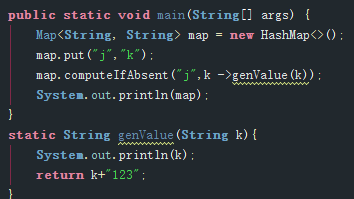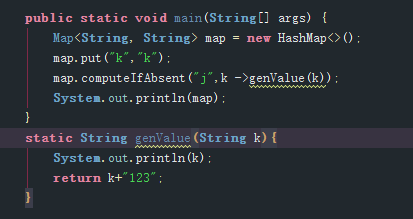HashMap源码(6)computeIfAbsent
文章目录
这个是Java8里面新增的功能
代码:
public V computeIfAbsent(K key,
Function<? super K, ? extends V> mappingFunction) {
if (mappingFunction == null)
throw new NullPointerException();
int hash = hash(key);
Node<K,V>[] tab; Node<K,V> first; int n, i;
int binCount = 0;
TreeNode<K,V> t = null;
Node<K,V> old = null;
if (size > threshold || (tab = table) == null ||
(n = tab.length) == 0)
n = (tab = resize()).length;
if ((first = tab[i = (n - 1) & hash]) != null) {
if (first instanceof TreeNode)
old = (t = (TreeNode<K,V>)first).getTreeNode(hash, key);
else {
Node<K,V> e = first; K k;
do {
if (e.hash == hash &&
((k = e.key) == key || (key != null && key.equals(k)))) {
old = e;
break;
}
++binCount;
} while ((e = e.next) != null);
}
V oldValue;
if (old != null && (oldValue = old.value) != null) {
afterNodeAccess(old);
return oldValue;
}
}
V v = mappingFunction.apply(key);
if (v == null) {
return null;
} else if (old != null) {
old.value = v;
afterNodeAccess(old);
return v;
}
else if (t != null)
t.putTreeVal(this, tab, hash, key, v);
else {
tab[i] = newNode(hash, key, v, first);
if (binCount >= TREEIFY_THRESHOLD - 1)
treeifyBin(tab, hash);
}
++modCount;
++size;
afterNodeInsertion(true);
return v;
}
这个功能首先是根据你的Key来寻找map中是否存在这个key,如果存在则直接获取到这个value返回并不会执行后面的mappingFunction方法操作,
if ((first = tab[i = (n - 1) & hash]) != null) {
if (first instanceof TreeNode)
old = (t = (TreeNode<K,V>)first).getTreeNode(hash, key);
else {
Node<K,V> e = first; K k;
do {
if (e.hash == hash &&
((k = e.key) == key || (key != null && key.equals(k)))) {
old = e;
break;
}
++binCount;
} while ((e = e.next) != null);
}
V oldValue;
if (old != null && (oldValue = old.value) != null) {
afterNodeAccess(old);
return oldValue;
}
}
这就是其寻找key的地方,如果没有找到会继续向下执行。
V v = mappingFunction.apply(key);
这个方法apply是Function的方法,其作用就是将key放到你写的方法中进行操作然后返回value,再将value存储:
if (v == null) {
return null;
} else if (old != null) {
old.value = v;
afterNodeAccess(old);
return v;
}
else if (t != null)
t.putTreeVal(this, tab, hash, key, v);
else {
tab[i] = newNode(hash, key, v, first);
if (binCount >= TREEIFY_THRESHOLD - 1)
treeifyBin(tab, hash);
}
++modCount;
++size;
afterNodeInsertion(true);
这就存储了value。其中afterNodeAccess和afterNodeInsertion这个是在LinkedHashMap里面的两个方法,是将map指向头的作用。
具体例子:

 修改参数后:
修改参数后:


